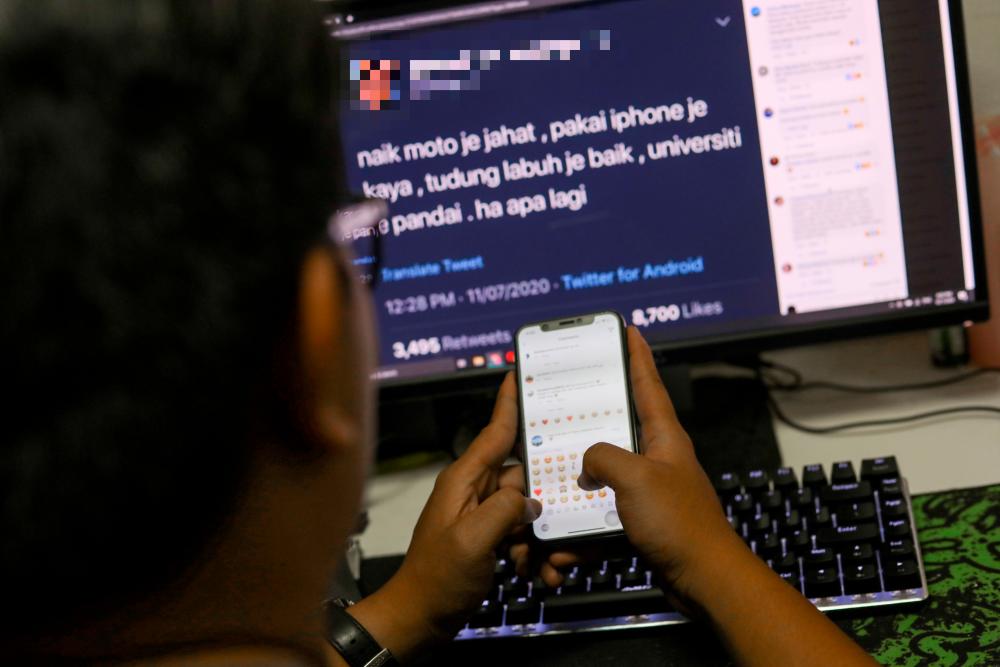UNDOUBTEDLY, one of humanity’s most remarkable achievements is the world wide web, revolutionising global communication and information sharing in ways that seemed like science fiction just a few decades ago.
However, along with its benefits, this technology also exposes us to harsh realities. Online trolling, bullying and stalking have become prevalent issues, making the lives of victims intolerable and in some cases unlivable.
The growth of the digital age has fostered unprecedented connectivity, yet it has also ushered in a new era fraught with online adversities permeating our digital landscapes.
The internet has become a refuge for various forms of abuse, inflicting serious harm on individuals, including transphobia, stalking and cyberbullying.
It is essential to grasp the multitude of hazards present on the internet. Online threats encompass a wide range of malicious actions aimed at harming individuals or groups.
One of the most common form of bullying is cyberbullying, where individuals leverage internet platforms to harass, threaten or demean others. Another insidious form is stalking, which utilises the vast databases of private information readily available online to persistently follow, monitor and harass individuals.
Moreover, the proliferation of discriminatory and hate speech, including transphobia, further pollutes online spaces, promoting an environment where marginalised individuals are more prone to exclusion and vulnerability. This raises the question of why certain individuals feel emboldened to express offensive sentiments on the internet. Do people perceive a sense of impunity to behave in certain ways online but would not dare in their offline lives?
What makes internet abuse possible? The digital environment offers offenders a false sense of anonymity and detachment, emboldening them to engage in behaviour they may refrain from in face-to-face interactions.
Holding individuals accountable for their actions is difficult as it is easy to create multiple online personas and conceal one’s identity.
Furthermore, due to the immediacy and broad reach of online communication, harmful remarks can rapidly disseminate to a large audience, significantly impacting the mental health and overall well-being of victims. This amplifies the impact of online abuse.
Addressing and intervening in such situations necessitates a deep understanding of the psychology underpinning online abuse.
Perpetrators on the internet often display aggressive, narcissistic or power and control-hungry tendencies. They may act on these impulses with impunity afforded by internet anonymity, deriving gratification from the suffering they cause to others.
Moreover, the absence of prompt repercussions for their conduct serves to further reinforce their behaviour, perpetuating an abusive cycle that may be hard to break.
We need to understand that the internet mirrors society with all its complexities and flaws. The frequency of abuse on the internet reflects larger societal issues including prejudice, inequality and structural injustices.
In addition to technological solutions, cultural shifts are also necessary to address the challenges associated with the internet. Fundamental to creating a more secure and more inclusive online community is educating individuals about digital citizenship and promoting empathy and respect in their online interactions.
Prof Andy Phippen asserts that “the internet is just a collection of cables, wires and routers, it does not have a dark side”. Instead, the internet reflects the negative facets of society.
In the fight against internet abuse, technical solutions are as crucial as societal measures. Implementing strong content moderation methods and reporting systems can aid in effectively identifying and mitigating harmful behaviour.
Furthermore, enhancing data security and privacy controls can empower individuals to protect their online identities and reduce their susceptibility to exploitation. The successful development and implementation of these solutions depend on cooperation among IT firms, legislators and civic society.
Artificial intelligence (AI) holds promise as a tool for combatting online abuse, with its ability to analyse large volumes of data and detect patterns indicative of harmful behaviour.
AI-powered content moderation systems can automatically detect and eliminate harmful information, lightening the workload for human moderators and boosting the effectiveness of response systems.
However, AI comes with inherent limitations and ethical considerations that need to be addressed. To mitigate biases and unintended consequences, it is crucial to subject AI systems to rigorous testing, review and training on diverse datasets.
To effectively address the widespread problem of online abuse, a multidisciplinary strategy incorporating sociological, psychological and technological aspects is needed.
By understanding the root causes of online harassment, empowering individuals to protect themselves and deploying technology judiciously, we can strive to create a safer and more inclusive digital environment.
This must remain a top priority, and collaboration across sectors is essential to implement comprehensive solutions that uphold the principles of justice, decency and respect in our online interactions.
The writer is a professor at the College of Computing and Informatics at Universiti Tenaga Nasional, a Fellow of the British Computer Society, a Chartered IT Professional, a Fellow of the Malaysian Scientific Association, a Senior IEEE member and a professional technologist at MBOT Malaysia. Comments: letters@thesundaily.com









